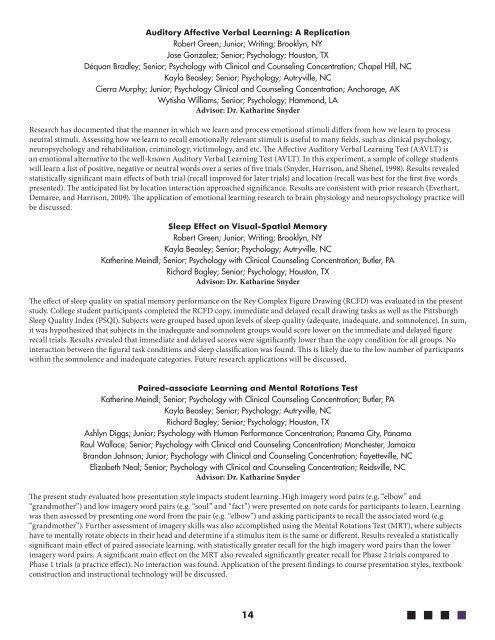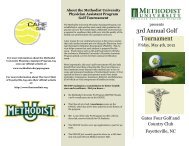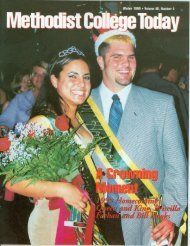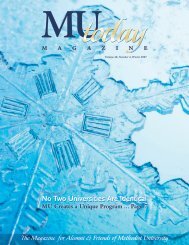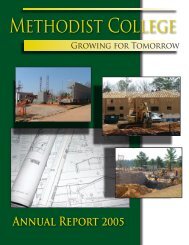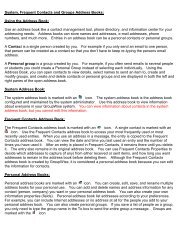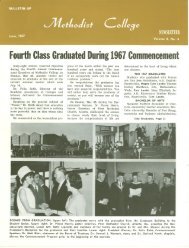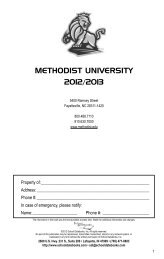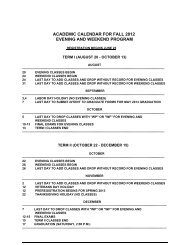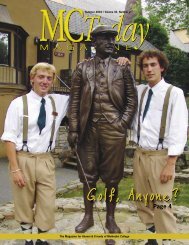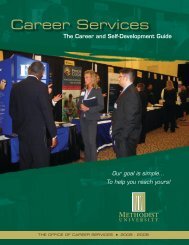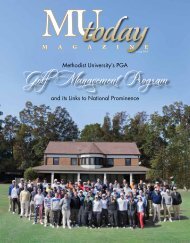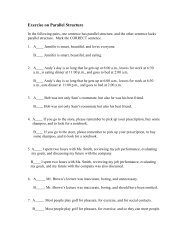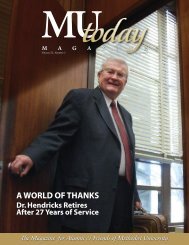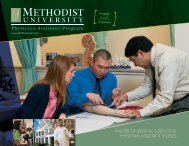Session Abstracts - Methodist University
Session Abstracts - Methodist University
Session Abstracts - Methodist University
Create successful ePaper yourself
Turn your PDF publications into a flip-book with our unique Google optimized e-Paper software.
Auditory Affective Verbal Learning: A Replication<br />
Robert Green; Junior; Writing; Brooklyn, NY<br />
Jose Gonzalez; Senior; Psychology; Houston, TX<br />
Déquan Bradley; Senior; Psychology with Clinical and Counseling Concentration; Chapel Hill, NC<br />
Kayla Beasley; Senior; Psychology; Autryville, NC<br />
Cierra Murphy; Junior; Psychology Clinical and Counseling Concentration; Anchorage, AK<br />
Wytisha Williams; Senior; Psychology; Hammond, LA<br />
Advisor: Dr. Katharine Snyder<br />
Research has documented that the manner in which we learn and process emotional stimuli differs from how we learn to process<br />
neutral stimuli. Assessing how we learn to recall emotionally relevant stimuli is useful to many fields, such as clinical psychology,<br />
neuropsychology and rehabilitation, criminology, victimology, and etc. The Affective Auditory Verbal Learning Test (AAVLT) is<br />
an emotional alternative to the well-known Auditory Verbal Learning Test (AVLT). In this experiment, a sample of college students<br />
will learn a list of positive, negative or neutral words over a series of five trials (Snyder, Harrison, and Shenel, 1998). Results revealed<br />
statistically significant main effects of both trial (recall improved for later trials) and location (recall was best for the first five words<br />
presented). The anticipated list by location interaction approached significance. Results are consistent with prior research (Everhart,<br />
Demaree, and Harrison, 2009). The application of emotional learning research to brain physiology and neuropsychology practice will<br />
be discussed.<br />
Sleep Effect on Visual-Spatial Memory<br />
Robert Green; Junior; Writing; Brooklyn, NY<br />
Kayla Beasley; Senior; Psychology; Autryville, NC<br />
Katherine Meindl; Senior; Psychology with Clinical Counseling Concentration; Butler, PA<br />
Richard Bagley; Senior; Psychology; Houston, TX<br />
Advisor: Dr. Katharine Snyder<br />
The effect of sleep quality on spatial memory performance on the Rey Complex Figure Drawing (RCFD) was evaluated in the present<br />
study. College student participants completed the RCFD copy, immediate and delayed recall drawing tasks as well as the Pittsburgh<br />
Sleep Quality Index (PSQI). Subjects were grouped based upon levels of sleep quality (adequate, inadequate, and somnolence). In sum,<br />
it was hypothesized that subjects in the inadequate and somnolent groups would score lower on the immediate and delayed figure<br />
recall trials. Results revealed that immediate and delayed scores were significantly lower than the copy condition for all groups. No<br />
interaction between the figural task conditions and sleep classification was found. This is likely due to the low number of participants<br />
within the somnolence and inadequate categories. Future research applications will be discussed.<br />
Paired-associate Learning and Mental Rotations Test<br />
Katherine Meindl; Senior; Psychology with Clinical Counseling Concentration; Butler, PA<br />
Kayla Beasley; Senior; Psychology; Autryville, NC<br />
Richard Bagley; Senior; Psychology; Houston, TX<br />
Ashlyn Diggs; Junior; Psychology with Human Performance Concentration; Panama City, Panama<br />
Raul Wallace; Senior; Psychology with Clinical and Counseling Concentration; Manchester, Jamaica<br />
Brandon Johnson; Junior; Psychology with Clinical and Counseling Concentration; Fayetteville, NC<br />
Elizabeth Neal; Senior; Psychology with Clinical and Counseling Concentration; Reidsville, NC<br />
Advisor: Dr. Katharine Snyder<br />
The present study evaluated how presentation style impacts student learning. High imagery word pairs (e.g. “elbow” and<br />
“grandmother”) and low imagery word pairs (e.g. “soul” and “fact”) were presented on note cards for participants to learn. Learning<br />
was then assessed by presenting one word from the pair (e.g. “elbow”) and asking participants to recall the associated word (e.g.<br />
“grandmother”). Further assessment of imagery skills was also accomplished using the Mental Rotations Test (MRT), where subjects<br />
have to mentally rotate objects in their head and determine if a stimulus item is the same or different. Results revealed a statistically<br />
significant main effect of paired associate learning, with statistically greater recall for the high imagery word pairs than the lower<br />
imagery word pairs. A significant main effect on the MRT also revealed significantly greater recall for Phase 2 trials compared to<br />
Phase 1 trials (a practice effect). No interaction was found. Application of the present findings to course presentation styles, textbook<br />
construction and instructional technology will be discussed.<br />
14


